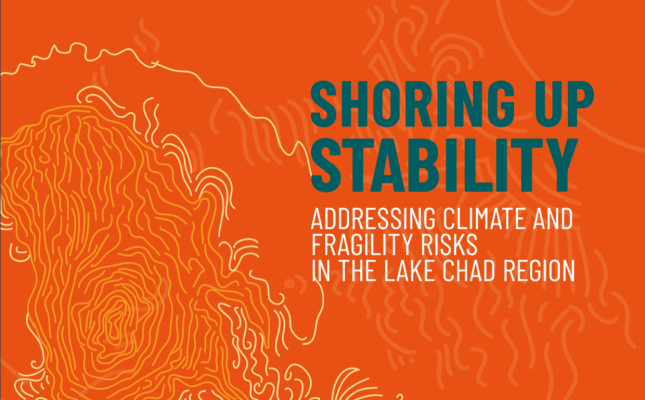-
New Report Addresses Climate and Fragility Risks in the Lake Chad Region
May 15, 2019 By Truett Sparkman
Contrary to popular belief, Lake Chad is not shrinking, according to Shoring up Stability: Addressing Climate and Fragility Risks in the Lake Chad Region, a new report from adelphi. This finding has profound implications for how the governments of countries bordering Lake Chad (Nigeria, Niger, Chad, and Cameroon) as well as the international community should address the conflict trap in which the people of the region are caught. “Supporting the people of the basin,” write the authors, “is not a function of saving Lake Chad from desiccation.”
The report reflects the G7’s commitment to tackling climate-related risks in fragile states. It was developed to build on the 2015 report, A New Climate for Peace: Taking Action on Climate and Fragility Risks, which the G7 commissioned the Wilson Center, adelphi, International Alert, and the European Union Institute for Security Studies to write. Shoring up Stability is a pioneer among climate-fragility risk assessments, offering new and nuanced insights into how climate and conflict impact vulnerable people and the prospects for peace in the Lake Chad region.
The past 10 years of violence and crisis in the Lake Chad Basin have “frayed social bonds among families and generations, and between the state and its citizens at all levels of governance,” write the authors. Simultaneously, “climate change is worsening the political and economic conditions that gave rise to the violence in the first place,” the report says. Together, these conditions have created a compound set of climate-fragility risks in the region.
Getting the Risk Assessment Right
The new report underscores the importance of taking an evidence-based approach to understanding a region’s specific climate-fragility risks in order to appropriately address them. Without a proper assessment, intervening governments are in danger of getting the diagnosis critically wrong, which in turn could result in interventions that exacerbate rather than alleviate the situation. In this case, designing an intervention based on the mistaken assumption that Lake Chad is shrinking could actually “increase and spread regional vulnerabilities as it could further undermine livelihoods that rely on the variability of the lake’s size,” the authors write.
While highly variable rainfall and climate change significantly impact the lake and the people who depend on it, the combined above and below ground water storage in the region has increased over the last 20 years. The report bases this conclusion on not only long-term hydrological data from the lake’s basin, but also on ground measurements and on a new analysis of 20 years of satellite observations. “This finding is critical because of its implications for what the region’s governments and the international community should focus on in seeking to address the Lake Chad crisis,” the authors write.
Key Climate-Conflict Risks
The report highlights four key climate-conflict risks that affect the Lake Chad Basin:
- The dynamics of ongoing conflict undermine people’s ability to adapt to the consequences of an increasingly variable climate. Factors that erode the region’s adaptive capacity include the persistent, large-scale displacement of people, restrictions to their movement due to the conflict, and weakened social cohesion after years of violence.
- Increased competition over natural resources has resulted from the major influx of displaced individuals now facing restricted access to resources and diminishing availability of quality land. The resulting conflicts—a growing number of which are turning violent—have been met by insufficient local conflict resolution capacity. The mixture of climate and conflict challenges has disrupted once effective governance and conflict resolution structures, which now either no longer exist or are too weak to defuse the growing tensions.
- Armed opposition groups persist in drafting new members into their ranks. In the context of “stark social and economic inequality, perceived lack of state legitimacy, increasingly vulnerable livelihoods,” and financial incentives, armed opposition is still a lure to some, according to the report. This problem is compounded by climate change, which undermines already fragile economies and livelihoods.
- Military measures taken by the region’s governments in response to violence have failed to address the root causes of the crisis. Rather, they have, at times, undermined livelihoods, damaged the social contract through human rights abuses, and reduced climate change adaptation potential in affected communities.
Together, these risks operate in a vicious feedback-loop, by which climate impacts exacerbate tensions over land and water resources in the Lake Chad region, while conflict dimensions erode communities’ abilities to adapt, say the authors.
Dealing with Climate Change Impacts
The “10 positive interventions” the report identifies to stabilize the situation and build peace in the region target the restoration of social cohesion within and between communities, the development of the social contract between states and their citizens, and the empowerment of climate adaptation, climate-proof economic development, and sustainable natural resource management. These focal points seek to address the specific compound climate-fragility risks identified in the region.
“Lake Chad needs an integrated push on many fronts to halt the negative spiral and put the region on a more positive track,” the authors write. Once this is achieved, the lake could become an asset to peace and security in the Lake Chad Basin. If the region is “to break free of the conflict trap,” the authors write, “we must tackle the impacts of climate change as part of peacebuilding efforts.”
Read More:
- The G7’s report, A New Climate for Peace, marked a stronger collective commitment to tackling climate-related risks in states experiencing situations of fragility.
- A global portrait of compound climate and fragility risks follows up on the G7’s 2015 report, A New Climate for Peace.
- In 2017, Lake Chad faced one of the worst humanitarian disasters since World War II.
Sources: adelphi, New Climate for Peace.
Topics: Cameroon, Chad, climate change, conflict, data, development, environment, featured, land, livelihoods, Niger, Nigeria, risk and resilience, security, water
 A Publication of the Stimson Center.
A Publication of the Stimson Center.



